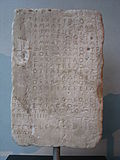Aorist (/ˈeɪərɪst/ AY-ər-ist; abbreviated AOR) verb forms usually express perfective aspect and refer to past events, similar to a preterite. Ancient Greek... 24 KB (2,750 words) - 11:01, 28 February 2024 |
In the grammar of Ancient Greek, an aorist (pronounced /ˈeɪ.ərɪst/ or /ˈɛərɪst/) (from the Ancient Greek ἀόριστος aóristos - ‘undefined’) is a type of... 30 KB (3,217 words) - 19:12, 16 December 2023 |
Ancient Greek verbs (section Aorist middle) the indicative mood there are seven tenses: present, imperfect, future, aorist (the equivalent of past simple), perfect, pluperfect, and future perfect... 85 KB (8,745 words) - 22:36, 10 April 2024 |
Proto-Indo-European verbs (redirect from Aorist (Indo-European linguistics)) and imperfective are known as the perfect, aorist and present systems: Stative = Perfect Perfective = Aorist Imperfective = Present The present/imperfective... 82 KB (7,771 words) - 13:34, 25 March 2024 |
Sanskrit verbs (section Aorist system) forms, and the distinctions in meaning between the imperfect, perfect and aorist forms are barely maintained and ultimately lost. Verb conjugation in Sanskrit... 55 KB (4,722 words) - 08:34, 6 March 2024 |
 | is spoken in the region of modern Sparta. Doric has also passed down its aorist terminations into most verbs of Demotic Greek. By about the 6th century... 48 KB (5,161 words) - 07:21, 14 April 2024 |
Gnomic aspect (redirect from Gnomic Aorist) e. Smyth, paragraph 1931: Gnomic Aorist (γνώμη maxim, proverb). – The aorist may express a general truth. The aorist simply states a past occurrence and... 9 KB (1,193 words) - 19:52, 12 December 2023 |
Bulgarian conjugation (section Past Aorist) the past aorist and the past active aorist participle. 6 Notice that the thematic vowel и (/i/) is changed to е (/ɛ/). 7 Since the past aorist and imperfect... 169 KB (3,305 words) - 22:54, 10 August 2023 |
Bulgarian verbs (section Past aorist (aoristus)) repetitive action, notice that the verb is in an independent clause) Past aorist imperfective verb: Вчера четох една книга = "Yesterday, I read a book" (but... 56 KB (4,069 words) - 08:47, 14 October 2023 |
it"). In Ancient Greek the infinitive has four tenses (present, future, aorist, perfect) and three voices (active, middle, passive). Present and perfect... 33 KB (4,457 words) - 20:07, 22 April 2024 |
Vedic Sanskrit grammar (section Aorist system) sibilant aorist is formed with the suffixation of s to the stem. The sibilant aorist by itself has four formations: athematic s-aorist athematic iṣ-aorist athematic... 32 KB (3,082 words) - 07:30, 9 April 2024 |
mood. The imperative mood is found in three tenses (present, aorist, and perfect). The aorist is used when the speaker wants something done at once, e.g... 45 KB (5,249 words) - 08:52, 5 November 2023 |
 | intensive aorist (present perfect, present continuous, past continuous) and the future (ad+aorist). Unlike other Berber languages, the aorist alone is... 44 KB (4,591 words) - 14:37, 23 April 2024 |
dissenting opinions have occasionally been voiced. In Homer, past-tense (aorist or imperfect) verbs appeared both with and without an augment. ὣς hṑs φάτο... 9 KB (862 words) - 18:18, 4 April 2024 |
Old Church Slavonic grammar (section Aorist) aorist became increasingly marked as an archaic language feature and was eventually replaced by the other two aorist formations. The asigmatic aorist... 105 KB (4,618 words) - 13:19, 5 December 2023 |
 | by Gary F. Zeolla or Greek Verbs. The form of the verb used is not the aorist imperative, which would indicate momentary or point action, but the present... 14 KB (1,584 words) - 17:41, 22 April 2024 |
Macedonian conjugation (section Aorist) synthetic series consists of three simple tenses—the present, imperfect and aorist—and the imperative mood. 1, 2 The syllabic thematic vowel и changes to the... 22 KB (690 words) - 01:06, 5 February 2024 |
best guide to the true stem, which is often more clearly manifested in the aorist or future tense forms. Note that none of these markers was productive in... 13 KB (891 words) - 09:49, 31 July 2023 |
Jay Jasanoff (section The sigmatic aorist) proto-middle *h2e-conjugation aorists with o/e-ablaut (later o/ø-ablaut) of the root, which gave rise to the Indo-Iranian passive aorist and the Tocharian subjunctive... 17 KB (1,609 words) - 14:52, 5 October 2023 |
 | modified noun. Serbian verbs are conjugated in four past forms—perfect, aorist, imperfect, and pluperfect—of which the last two have a very limited use... 49 KB (4,509 words) - 02:00, 9 April 2024 |
The optative mood in Greek is found in four different tenses (present, aorist, perfect and future) and in all three voices (active, middle and passive)... 26 KB (2,525 words) - 14:20, 21 December 2023 |
Ancient first aorist infinitive suffix -αι has been replaced by second aorist suffix -ειν 4. Attachment of the /e/ sound to the ancient aorist infinitive... 39 KB (3,136 words) - 06:13, 6 April 2024 |
mostly behaves like an ergative–absolutive language in the Series II ("aorist") screeves. That means that the subject of an intransitive verb will take... 44 KB (5,005 words) - 16:26, 31 January 2024 |
bring that guest to my house?" The following uses the aorist indicative followed by an aorist imperative: εἰ ἤκουσάς τι τούτου τοῦ πράγματος τοῦ γενομένου... 49 KB (5,413 words) - 21:48, 27 February 2022 |
only: the present, the aorist, and the perfect. The perfect is, however, rarely used. The difference between the present and aorist subjunctive is one of... 26 KB (2,692 words) - 21:50, 27 February 2022 |





